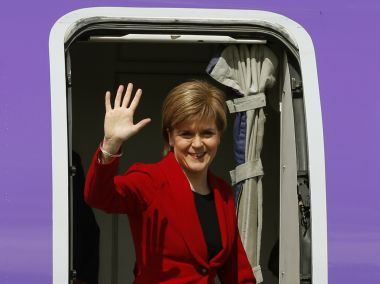The General Election: Scotland's Revolution

If the result of the General Election in the UK as a whole was somewhat of a surprise and a bit of a bloody nose for the pollsters, the results in Scotland are a revolution.
The numbers are staggering. The Scottish National Party has moved from six to 56 seats (out of 59). The Tories retained their one seat in the Scottish Borders, the Liberal Democrats lost 10 of their 11 seats (retaining only Orkney and Shetland) and Labour lost 40 of its 41 Scottish seats, just managing to hold on to Edinburgh South. Seats in which Labour votes could be weighed rather than counted have all turned SNP. The youngest MP since 1667 is Mhairi Black of the SNP aged 20. Twenty of the 56 SNP MPs are women.
But these stark numbers don't tell the whole story. As someone who has lived in Scotland for five decades I can't quite get my head round the idea that there are no Labour MPs in Glasgow, no Lib Dems in the Highlands and no Conservatives in Edinburgh. It's as though there were no Labour MP's north of Watford and no Conservatives in the Home Counties.
I am currently in New York and I know that I will be returning home to a United Kingdom that is no longer united, despite the promise of the Prime Minister to govern 'one nation'. England voted overwhelmingly Conservative (even if Labour had retained every one of its Scottish seats it would not have won) and Scotland, thanks to the vagaries of the electoral system, voted overwhelmingly SNP. So what are the lessons for the Church?
Firstly, the United Kingdom is in grave danger of falling apart. What was originally conceived as a union of Protestant kingdoms and has in the providence of God overall been a blessing to the Church of Christ and the cause of the Gospel throughout the world, is fading.
Secondly, the SNP won not only because it is well-organised, well-led and has largely governed well in Scotland; it won because David Cameron granted a referendum last year. About a year before the actual referendum, those of us who are Scottish and live in Scotland became aware of a change in the atmosphere. Everywhere you went, from village to city centre, from suburb to housing scheme, there was excitement and tens of thousands of people getting involved.
If David Cameron thought that the referendum 'No' would be the end of the process he was sadly mistaken. Within a couple of months the SNP membership had risen from 25,000 to more than 100,000. Nicola Sturgeon spoke at venues to thousands of people. It is very important for people in the rest of the UK to understand that this was not done because of some emotional nationalism (the rather sinister comparison with the Nazis whispered by some was just silly – Nicola is not Hitler). It was done because people who were cynical, disenfranchised and disengaged felt hope. Ordinary people got involved and they turned out in their tens of thousands to campaign and to vote.
There is no doubt that sometimes things got a little heated and some people were ill-disciplined. But overall the hope, belief and indeed even joy have been impressive to watch. The real danger lies in what lies ahead. Some have compared the current state of the SNP to that of a religious sect with all the dangers that it brings. I think that is a bit simplistic.
But I don't believe that the kind of hopes currently being invested in the SNP will ultimately bring what people are looking for. Salvation does not come through politicians. Good government does. If hopes are dashed there will be an inevitable reaction. The situation has been made worse because of the effective Conservative campaign in England warning about a 'Jockapolypse'. There is as much a danger from English nationalism to the Union as there is from Scottish nationalism.
Thirdly, we must pray. Pray for all the people of the United Kingdom. Pray for the Prime Minister, the new leaders of the Labour, Liberal and UKIP parties and pray for the people of Scotland. That our new and inexperienced MPs will learn quickly and grow, that our hopes and expectations will be realistic and that their will be a renewal of biblical Christianity in Scotland – a spiritual revolution.
May the day come when our nickname as 'the land of the people of the book', will not be a remnant from the past, but rather a description of the present.
Rev David Robertson is the Moderator-Elect of the Free Church of Scotland.











